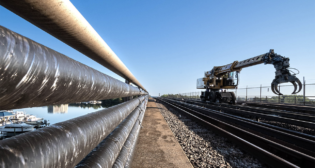
APTA: Transit systems suffer fiscal stress
Written by William C. Vantuono, Editor-in-ChiefNearly 80% of U.S. public transit system have raised fares or cut service, or plan to do so shortly, in response to declines in local and state funding support, a survey released by the American Public Transportation Association said Wednesday.
 The report, “Impacts of the Recession on Public Transportation Agencies,” can be accessed here. The study noted increasing fuel prices also contributed to the stress on numerous systems relying on diesel fuel for bus fleets, as well as some rail operations.
The report, “Impacts of the Recession on Public Transportation Agencies,” can be accessed here. The study noted increasing fuel prices also contributed to the stress on numerous systems relying on diesel fuel for bus fleets, as well as some rail operations.
The APTA study said 71% of responding agencies saw flat or decreased local and/or regional funding, and 83% saw flat or decreased state funding. These decreases are on top of an already stagnant funding situation in 2010, APTA said.
“Public transportation systems are currently experiencing decreases in their funding during a time when many are serving increased number of riders,” said APTA President William Millar. “Systems are forced to continue to freeze positions and lay off workers, which makes providing necessary transit service even more difficult.”
APTA said six in 10 larger agencies (63%) implemented or approved hiring freezes, more than the number from the previous 2010 survey (54%), with 75% of larger agencies reducing the number of positions and 46% of larger agencies reporting implementing or approving layoffs.
In addition, 85% of transit agencies have seen flat or decreased capital funding. APTA says the phasing out of the federal government’s American Reinvestment and Recovery Act (ARRA) has increased stress on state and local budgets. The association notes that ARRA provided a needed boost for state and local infrastructure projects.
The U.S. House Transportation and Infrastructure Committee has proposed to cut an additional 37% in federal funding to public transportation and all surface transportation programs, APTA said. “If the House proposal is implemented, it will have a chilling effect on our country’s ability to create jobs and provide access to jobs necessary to move the economy forward,” said Millar.



